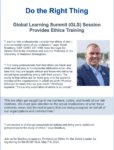The foundation for any profession starts with a mature understanding of ethics. Knowing what is right and wrong doesn’t come ‘naturally’, by so called ‘common sense’ or from god. The AIHS BoK Chapter on non-ethics is constructed on these assumptions and is useless for any real understanding of … [Read more...] about Ethics and the Foundation for Being Professional
Ethics
The Safety Dunce
The profession of teaching learned over 100 years ago that humiliation, shaming and victimising doesn’t work. Indeed, such strategies are not just ineffective but drive the opposite. Understanding ethics in teaching was essential for claiming the status of ‘professional’. Not so Safety. I was … [Read more...] about The Safety Dunce
From Procedure to Profession: A Comparison of Safety and Nursing Ethics
The Missing Ethic: Safety’s Core Challenge by Simon Renatus For a pursuit that claims to protect lives, Safety is surprisingly quiet about the lives it influences. Unlike professions such as nursing, where respect, kindness, and relational responsibility are core values, Safety remains focused on … [Read more...] about From Procedure to Profession: A Comparison of Safety and Nursing Ethics
The Rights and Wrongs of What is Right and Wrong
How strange this industry that thinks that Safety is objective and has no interest in ethics. The very language of right and wrong invokes an ethic, methodology and ontology (theory of being). All this silly focus by S2 on positive vs negative, what goes right or what is determined to be wrong, says … [Read more...] about The Rights and Wrongs of What is Right and Wrong
The Power and Powerlessness of Safety
When it comes to a discussion of ethics, how curious that Safety never talks about power. In the AIHS BoK Chapter on Ethics it gets no mention. How strange, when the foundation of any ethic is an understanding of power. This is the level of intelligence one gets from a mono-disciplinary association … [Read more...] about The Power and Powerlessness of Safety
Sifting the Chaff from the Wheat in Safety
I have discussed the skill and wisdom of discernment previously: https://safetyrisk.net/wisdom-discernment-and-an-ethic-of-safety/ https://safetyrisk.net/the-need-for-discernment-in-risk-and-safety/ https://safetyrisk.net/social-psychology-applied-to-the-discernment-of-risk/ I have … [Read more...] about Sifting the Chaff from the Wheat in Safety
Safety, The Expert in Everything and the Art of Learning Nothing
There’s a huge difference between Safety trying to do Ethics and an Ethicist doing safety! Isn’t it bizarre that when Safety wants to learn about Ethics it asks an engineer, this is a classic example: Or when it wants to know about culture it asks an engineer whose tag identity is ‘the … [Read more...] about Safety, The Expert in Everything and the Art of Learning Nothing
Shame and Blame as Social Semiosis
Popular discourse on shame and blame tend to place emphasis on the individual. Shame often emerges out of blame but this most often occurs in a social context. If someone does know about an action or event anchored to you, then I guess any sense of shame is only private or historical. Blame and … [Read more...] about Shame and Blame as Social Semiosis
The Problem of Blame for Fallible People
The foundation for understanding the psychology of blame is not with the action of blaming but rather the nature of fallibility (https://www.humandymensions.com/product/fallibility-risk-living-uncertainty/). The real challenge is not to focus on the action of blame but rather Everyday Social … [Read more...] about The Problem of Blame for Fallible People
An Ethic for Innovation
I read with fascination the development (not innovation) of the Raptor AI. This development can: ‘Additionally, the Raptor AI is able to collect data and store information including facial recognition, car registration numbers and wireless device detection to continue ensuring the safety of … [Read more...] about An Ethic for Innovation











